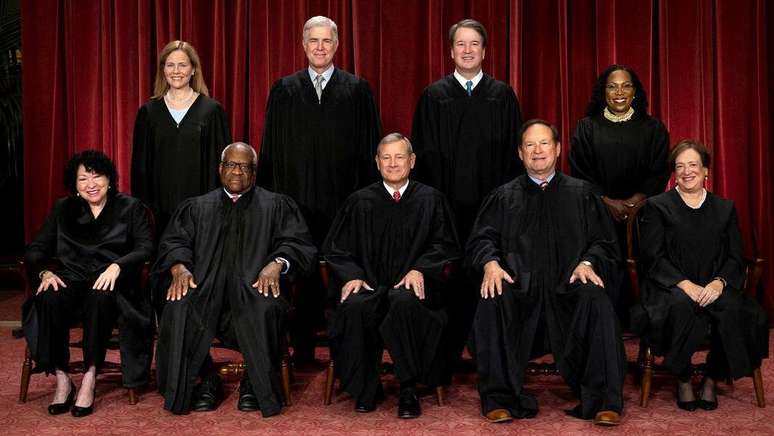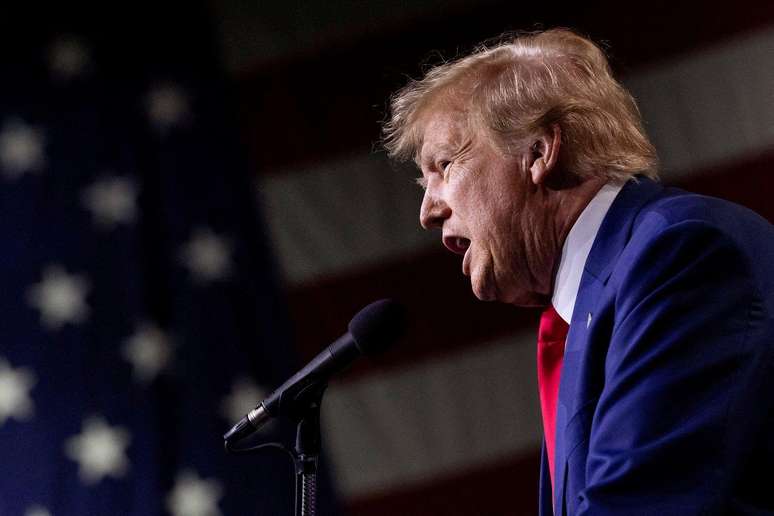Article 3 of the 14th Amendment bars those who have “engaged in insurrection or rebellion” against the established power from holding federal office; The decision against Trump was the first time a constitutional provision was used to make a presidential candidacy impossible.
A provision of the United States Constitution rarely used in judicial decisions led this Tuesday (12/19) to the Colorado Supreme Court’s decision to remove Donald Trump from the 2024 election race in the state.
The clause invoked was Section 3 of the 14th Amendment, which bars those who “have engaged in insurrection or rebellion” against the established power from holding federal office.
This is the first time Section 3 of the 14th Amendment has been used to make a presidential candidacy impossible. The lawsuit against Trump was brought by the Washington-based group Citizens for Responsibility and Ethics (Crew) and targets his role in the 2021 Capitol attacks.
The state court’s decision is expected until January, pending appeal, and does not apply to other states.
The final judgment will likely rest with the conservative U.S. Supreme Court that Trump helped form.
In the Colorado case, it appears the plaintiffs intended to take their arguments to the highest court in the land from there.
Initially supported by liberals, the legal issue surrounding the constitutional clause has gained greater prominence in recent months as some conservatives have also embraced it.
The Colorado Supreme Court was the first to recognize the argument, removing Trump from the state’s 2024 presidential election.
Until then, several actions against Trump with similar arguments have been unsuccessful in other states.
A lawsuit in New Hampshire was dismissed; a Michigan judge ruled that it was a “political” issue that should be decided by Congress, not the state; and a Minnesota court rejected the effort before the primary election, but left the door open for petitioners to mount another challenge in the general election.
The legal strategy is a last-ditch effort to block the candidacy of a former president who remains popular among his base.
Despite mounting troubles in the courts, Trump remains the favorite for the Republican presidential nomination and is tied with President Joe Biden in election polls.
The Trump campaign said Colorado’s action is intended to “extend the law beyond recognition” and has no basis “except in the minds of those who defend it.”
“Democratic Party leaders are in a state of paranoia due to President Trump’s growing and dominant lead in the polls,” spokesman Steven Cheung said.
“They have lost faith in Biden’s failed presidency and are now doing everything they can to stop American voters from throwing them out of office in November [de 2024]”.
Trump’s lawyer in the Colorado case argued that the Michigan and Minnesota decisions are evidence of “an emerging consensus throughout the justice system.”
“Plaintiffs are asking this court to do something that has never been done in the history of the United States,” attorney Scott Gessler said. “The evidence doesn’t come anywhere close to allowing the court to do that.”
What is the argument?
The 14th Amendment was ratified after the American Civil War, and Section 3 was inserted to prevent secessionists from returning to their former government positions once the Southern states rejoined the Union.
The clause was used against people such as Confederate President Jefferson Davis and his vice president Alexander Stephens, but has rarely been invoked since.

The clause resurfaced following Trump’s efforts to overturn his 2020 election defeat, culminating in the attack on the Capitol in January 2021.
Following the attack, the US House of Representatives voted to impeach the president on charges of “incitement of insurrection”.
In the United States, impeachment is the first part – the indictments – of a political process through which Congress can remove a president from office. If the House votes to approve the articles of impeachment, the Senate will have to hold a trial.
After a possible conviction, the Senate can proceed to a second vote, by simple majority, to prevent a president from returning to office.
But, in the case of the Capitol, the Senate failed to reach the two-thirds majority needed even in the first phase to convict Trump.
Does the clause apply to Trump?
The Free Speech For People organization argued that yes, Trump should be barred from running for office due to Section 3 of the 14th Amendment.
Last year, the group filed lawsuits against five Trump-supporting lawmakers accused of being “insurrectionists.”
One of the lawsuits – against Georgia congresswoman Marjorie Taylor Greene – was tried in court but ultimately defeated.
The 14th Amendment was not only written to apply after the Civil War, but also against future insurrections, says Ron Fein, the organization’s legal director.
He told the BBC that the attack on the Capitol succeeded in “delaying the peaceful transfer of power for the first time in our nation’s history, which is further than the Confederates ever achieved.”
“The specific candidates we impeach in 2022 participated in or assisted in the efforts that led to the insurrection,” Fein said.
All of these cases, he said, have established important legal precedents that can be applied to demonstrate that “Trump is the primary insurrectionist.”
In New Mexico, a lawsuit brought by the group Citizens for Responsibility and Ethics of Washington (Crew) led to the removal from office of Couy Griffin, a local county commissioner who participated in the attack on the Capitol under Section 3 – the first decision of the type since 1869.
What will be the next steps?
The Colorado action was filed by the Crew group on behalf of six state residents.
Despite unsuccessful attempts in Michigan and Minnesota, the organization Free Speech For People has also made it known that it will present new actions of this type. The victory in Colorado will likely give further impetus to such actions.
Each action has already raised or will inevitably raise an objection from candidates, triggering lawsuits that could eventually reach the U.S. Supreme Court.

The legal argument gained strength in August, when Trump was charged with election subversion in two separate criminal cases.
That same month, conservative legal scholars William Baude and Michael Stokes Paulsen wrote in an article that Section 3 “is self-executing, operating as an immediate disqualification from holding office without the need for further action by Congress.”
Trump could therefore be considered ineligible to vote” by all officials, state or federal, who judge his qualifications [dos candidatos]”, concluded the two lawyers.
Baude and Paulsen are members of the Federalist Society, a very influential conservative group.
They believe that the Constitution should be interpreted as originally intended by its framers.
Even the Supreme Court, with its conservative majority and trio of Trump-appointed justices, may be receptive to the argument, says Jeffrey Sonnenfeld, dean of the Yale School of Management who supports Baude and Paulsen’s perspective.
With Republican voters headed to primaries in less than two months, any action must be decided quickly.
What do critics of the legal argument say?
However, there are several prominent critics of the use of Section 3 of the 14th Amendment against Trump.
In an op-ed for Bloomberg, liberal professor Noah Feldman wrote, “Donald Trump is clearly unfit to be president. But it’s up to voters to stop him. The magic words of the past won’t save us.”
New Hampshire Republican Party Chairman Chris Ager said he is not a Trump supporter, but rather “neutral,” but views the initiatives with concern.
“All these attempts are bad for the country. Producing a tortuous legalistic logic to try to prevent people from voting for whoever they want is a Soviet-style, banana republic argument,” Ager said.
Even Brad Raffensperger, a Republican who was once the target of Trump’s ire as Georgia’s top elections official, criticized lawsuits evoking the constitutional clause. He argues that they are “just the latest way to try to short-circuit the ballot box.”
But in New Hampshire, the first state in the country to vote in the Republican primary, a prominent Republican lawyer who ran for Senate in 2020 with Trump’s support has a different opinion.
“To me it’s purely a question of the Constitution,” Bryant “Corky” Messner said. “The Constitution of the United States is more important than any individual, whether Donald Trump or anyone else.”
Messner wants the courts to issue their verdict so he can decide whether or not to support Trump.
“If he is ultimately nominated by the Republican Party and is not disqualified, I will vote for him,” he said.
Source: Terra
Rose James is a Gossipify movie and series reviewer known for her in-depth analysis and unique perspective on the latest releases. With a background in film studies, she provides engaging and informative reviews, and keeps readers up to date with industry trends and emerging talents.






